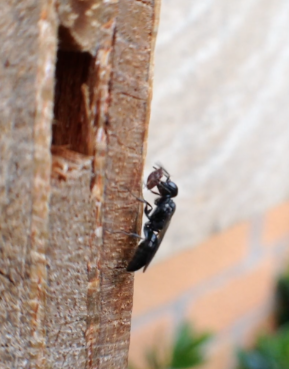Solitary wasp as an aphid pest controller!
Don’t spray your plants to be rid of aphids. Leave it to the natural aphid controllers. Not all wasps sting us! In fact, most do not. They never show any interest in humans whatsoever. Yet they have such a bad name because a few may sting. Besides solitary wasps, there are hoverfly larvae, lacewings, ladybirds and their larvae, birds, predatory bugs, earwigs and predatory beetles. Find a comprehensive list and descriptions by the RHS- Aphid Hunters
Passaloecus sp.
I’m not a wasp expert and am assuming this is a passaloecus species with its resinous nest walls. Also is known as the aphid wasps!! Reading BWARS, it states that these wasps will nest in decayed wood, is reported to supersede other species and will compete for such nests. I have seen them discard aphids and drop them outside the nest, go foraging and return to restock the same nest! According to Yeo & Corbet, the wasp upon finding a colony of aphids, swayed her body and head from side to side repeatedly, as if taking a fix on an individual aphid a few millimetres away, leaping forward to seize the aphid then returning to her nest. I have seen them grab an aphid and manipulate it with their mandibles before flying off. I always thought solitary wasps would paralyse their prey by stinging. Not so in this case. They continue, the wasp squeezes her captured prey around the neck region with her mandibles and after this treatment, the aphids are paralysed; they cannot walk, but remain fresh, with their hearts beating. I have also seen a few aphids walk out of the nest probably not manipulated enough to completely paralyse it.

Passaloecus sp?. aphid hunter
They mention that one species of Passaloecus, P. corniger, steals the aphids of other Passaloecus species and there is no evidence that she hunts for herself! She is a sneak burglar who will dart inside a nest site whilst the owner is out, grab an aphid and take it to her nest. Her nest site can even be the nest site of another wasp that she has emptied of aphids! She will even open up a sealed cavity of another wasp in order to steal. Because she steals the aphids of other wasps, she sometimes receives aphids that have already been stolen more than once, so now she is ‘handling stolen goods!’ What a wasp, all going on inside your garden.
More info and a new film to follow.

Recent Comments